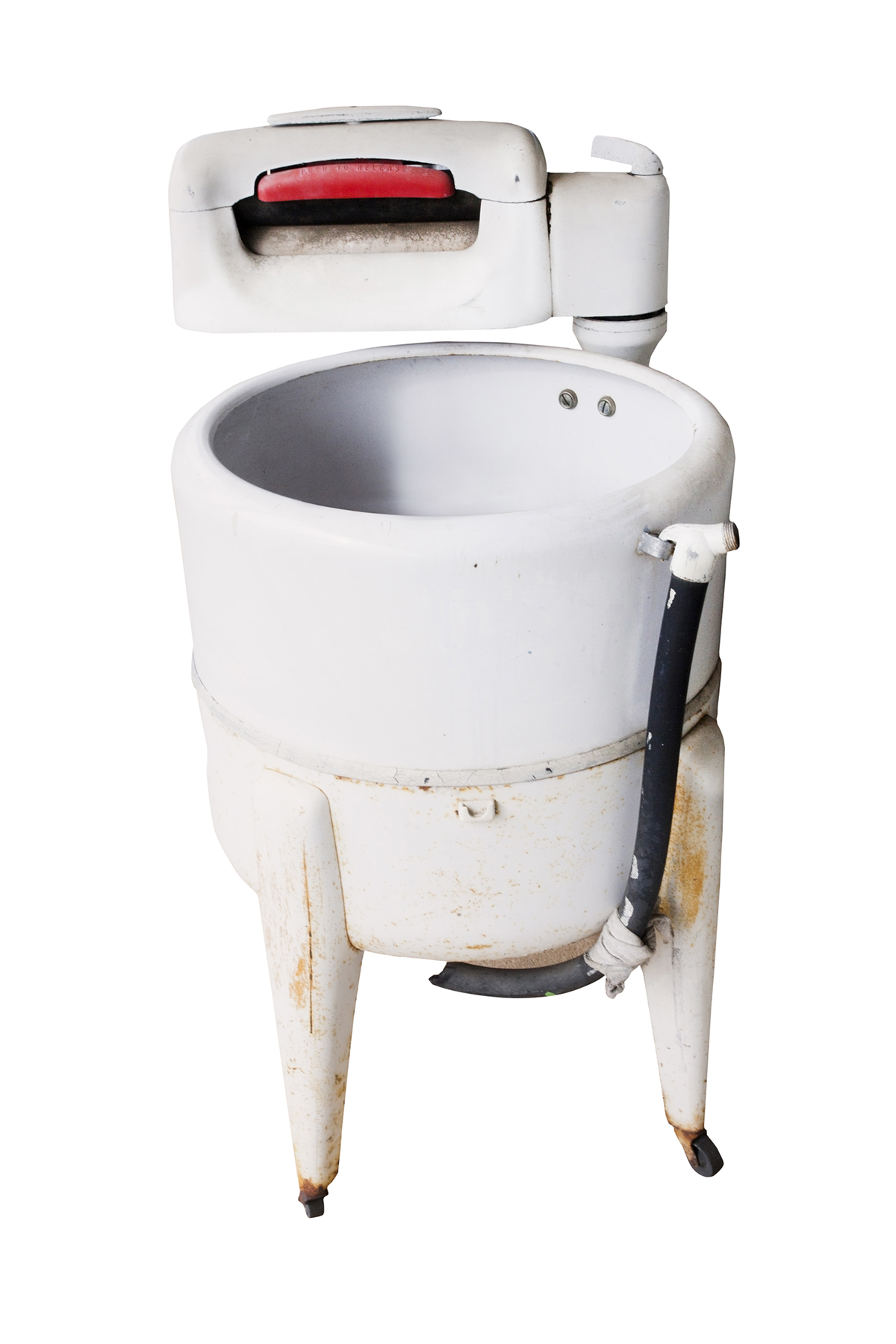

by Howard Whittlesey
Synopsis: Recalling yesteryear, Howard reminds us of wringer washing machines, scrub boards, and galvanized buckets. Physical garments are not the only objects that need cleansing (Rev. 22:14).
This writer has fond memories of his mother on washday. The ole wringer washer was downstairs in the basement. A few hours were spent in the process, which began by separating the clothes into piles. The three tubs were filled with water to set up three of the four-step process. First, she filled the washtub with warm water, along with each rinse tub. When a load was removed from the washtub, the wringer was engaged to wring out the soapy wash water. As the clothes were wrung out, they were transferred into the first rinse tub, where Mother would work with the clothes to remove more of the suds. Step three was pretty much a repeat thereof before wringing them for the third time into a clothes basket and taking them to the clothesline. My mother would choose a hymn of her liking and sing it while doing the work. It was never perceived quite this way while she did this, but, in retrospect, it's easy to see that the singing was a sign that everything was "A-Okay" on wash day. No matter how soiled the clothes had become, they were fit for wearing once again as a result of her tireless work.
Have you thought of the "wash day" for the soul? As sinners, we must acknowledge the sin-soiled condition of our souls by being washed in the blood of the Lamb. When this washing occurs, we know that all the soil is removed, and our spiritual garments will be white as snow. King David made a similar analogy: "Wash me, and I shall be whiter than snow" (Ps. 51:7). A beautiful prophetic assurance is given in Isaiah 1:18, which says, "Though your sins be as scarlet, they shall be as white as snow." As with mother, a song accompanies the washing quite often. Mother made the clothing fit for wearing again; Jesus made the spiritual garment fit for the kingdom of heaven.
Mother and Jesus knew that, on the following days, garments would get dirty again, so as to require additional cleansing. When the light of day, or the lamp, revealed to mother that it was time to "shed the dirty clothes," we put our clothes in the "dirty wash," as she called it. The apostle John has a similar idea for the soul in 1 John 1:7, which says, "But if we walk in the light as He is in the light, we have fellowship one with another, and the blood of Jesus cleanseth us from all sin." The light that exposes the soiled condition of clothing, or of the soul, also reveals the cleanliness thereof for all to see.
Let's turn our thoughts to what God inspired two writers to share with us concerning our sins that were cleansed by the blood of Christ. (1) Jeremiah prophesied as follows: "And they shall teach no more every man his neighbor, and every man his brother, saying, Know the Lord: for they shall all know me, from the least of them unto the greatest of them, saith the Lord: for I will forgive their iniquity, and I will remember their sin no more" (31:34). (2) The Hebrew writer offers a rerun of this prophecy. Hebrews 8:12 says, "For I will be merciful to their unrighteousness, and their sins and their iniquities will I remember no more." This thought is repeated in Hebrews. 10:17, which says, "And their sins and iniquities will I remember no more."
Question: Is there any similarity between forgiveness and renovation? Recognizing God's omniscience, we understand that He will never forget our sins. Yet, His commitment in the passages just cited show that He will never again bring up our sins, once the blood of Christ cleanses them. This necessitates that the sinner, once purified, must initiate no recall himself as well.
The Readers Digest Encyclopedic Dictionary defines "renovate" as (1) "to make as good as new; repair; (2) to renew; refresh; reinvigorate." If you have renovated anything, you recognize the impact of this definition. However, do you realize the same on behalf of your brother, whose soul is cleansed from all sin? It matters not whether the individual in question was immersed in baptism, or repented of his sinful condition and was heard in his confession of sins unto forgiveness. This soul seeks spiritual renovation. God has granted such.
What about us? Think: The sinner has demonstrated the courage to experience the renovation unto his soul's salvation. When anyone who knows of the sinner's sin, and also knows of his repentance, confession, and baptism—or his confession of past sins—then whatever relationship was marred by the sin must undergo a renovation. Your forgiveness will never be what it needs to be without it. You must speak to that restored brother cordially, look at him with joy and tenderness, and not bring up his sin again. Oh yes, you may not forget it, but God's promise to the sinner leaves a residual responsibility on each of us that knows the restored sinner.
Please answer the following questions: (1) Can you shake his hand as before? (2) Can you invite him to a social occasion as before? (3) Can you discuss social or spiritual matters as before? (4) If yes—does your face show a quest for a growing love even more than before? (5) If you used to sit in the same pew, have you resumed that status due to his renovation? (6) If you told others outside the congregation about his sin, have you renovated the hearers of your words so that they can treat that person just as respectfully as you should? (7) How do you feel about facing God in judgment if you fail to do what these questions suggest?
Let's finish with Jesus' "Golden Rule" in Matthew 7:12, and focus on "Do ye even so." Whether you are the offender or the offended, you are both working to defeat Satan's quest to destroy one or more souls. The renovation of everyone concerned is paramount to our hope of eternal life. If Jesus said, "for this is the law and prophets," in that same verse, then we have to believe that He is saying that relationships mean everything. Perhaps we should seek to be describable by Paul's words in 2 Corinthians 5:17, "Old things are passed away; behold, all things are become new." Be ye renovated!
Author Bio: Howard lives in Denver, IN. He served as a choir director in grades 7-12 for thirty-nine years. He and his wife, Colleen, have four children. He can be reached at howcolwhit@aol.com.

